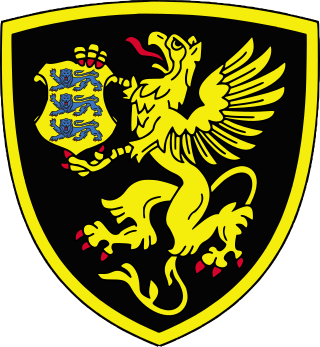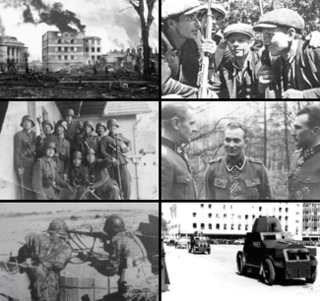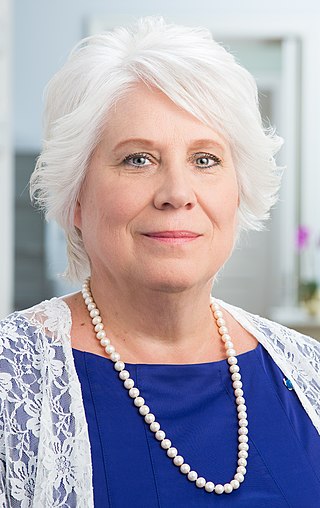Related Research Articles
Politics in Estonia takes place in a framework of a parliamentary representative democratic republic, whereby the Prime Minister of Estonia is the head of government, and of a multi-party system. Legislative power is vested in the Estonian parliament. Executive power is exercised by the government, which is led by the prime minister. The judiciary is independent of the executive and the legislature. Estonia is a member of the United Nations, the European Union, and NATO.

Latvia, officially the Republic of Latvia, is a country in the Baltic region of Northern Europe. It is one of the three Baltic states, along with Estonia to the north and Lithuania to the south. It borders Russia to the east and Belarus to the southeast, and shares a maritime border with Sweden to the west. Latvia covers an area of 64,589 km2 (24,938 sq mi), with a population of 1.9 million. The country has a temperate seasonal climate. Its capital and largest city is Riga. Latvians belong to the ethnolinguistic group of the Balts and speak Latvian. Russians are the most prominent minority in the country, at almost a quarter of the population; 37.7% of the population speak Russian as their native tongue.
An ethnocracy is a type of political structure in which the state apparatus is controlled by a dominant ethnic group to further its interests, power, dominance, and resources. Ethnocratic regimes in the modern era typically display a 'thin' democratic façade covering a more profound ethnic structure, in which ethnicity – and not citizenship – is the key to securing power and resources.

The Estonian Internal Security Service is a central national security institution of Republic of Estonia. Its purposes are centered on enforcing constitutional order. The Estonian Internal Security Service has primary investigative jurisdiction in some offences committed by state officials; countering terrorism; incitement to hatred; crimes against humanity and peace, including war crimes; illegal handling and trafficking of firearms, ammunition, explosives, radioactive material or other strategic materials; and the protection of state secrets. It also fills counterintelligence duties.

In Estonia, the population of ethnic Russians is estimated at 296,268, most of whom live in the capital city Tallinn and other urban areas of Harju and Ida-Viru counties. While a small settlement of Russian Old Believers on the coast of Lake Peipus has an over 300-year long history, the large majority of the ethnic Russian population in the country originates from the immigration from Russia and other parts of the former USSR during the 1944–1991 Soviet era of Estonia.

Russia–European Union relations are the international relations between the European Union (EU) and Russia. Russia borders five EU member states: Estonia, Finland, Latvia, Lithuania and Poland; the Russian exclave of Kaliningrad is surrounded by EU members. Until the radical breakdown of relations following the 2022 Russian invasion of Ukraine, the EU was Russia's largest trading partner and Russia had a significant role in the European energy sector. Due to the invasion, relations became very tense after the European Union imposed sanctions against Russia. Russia placed all member states of the European Union on a list of "unfriendly countries", along with NATO members, Switzerland, Ukraine, and several Asia-Pacific countries.
The term ethnic democracy, as used by some political scientists, purports to describe a political system that combines a structured ethnic dominance with democratic, political and civil rights for all. Both the dominant ethnic group—typically an ethnic majority—and the minority ethnic groups have citizenship and are able to fully participate in the political process. However, critics of the "ethnic democracy" model argue it is a contradiction in terms, and thus conceptually inadequate or confusing; these critics allege that purported ethnic democracies, most notably Israel, are not democratic at all, or are at best a sort of semi-democracy.

Estonia–Russia relations are the bilateral foreign relations between Estonia and Russia. Diplomatic relations between the two countries were established on 2 February 1920 after the Estonian War of Independence ended in Estonian victory with Russia recognizing Estonia's sovereignty and renounced any and all territorial claims on Estonia.

Non-citizens or aliens in Latvian law are individuals who are not citizens of Latvia or any other country, but who, in accordance with the Latvian law "Regarding the status of citizens of the former USSR who possess neither Latvian nor other citizenship," have the right to a non-citizen passport issued by the Latvian government as well as other specific rights. Approximately two thirds of them are ethnic Russians, followed by Belarusians, Ukrainians, Poles, and Lithuanians.

Estonia declared neutrality at the outbreak of World War II (1939–1945), but the country was repeatedly contested, invaded and occupied, first by the Soviet Union in 1940, then by Nazi Germany in 1941, and ultimately reinvaded and reoccupied in 1944 by the Soviet Union.

The three Baltic countries, or the Baltic states – Estonia, Latvia, and Lithuania – are held to have continued as independent states under international law while under Soviet occupation from 1940 to 1991, as well as during the German occupation in 1941–1944/1945. The prevailing opinion accepts the Baltic thesis that the Soviet occupation was illegal, and all actions of the Soviet Union related to the occupation are regarded as contrary to international law in general and to the bilateral treaties between the USSR and the three Baltic countries in particular.

Marina Kaljurand is an Estonian politician and Member of the European Parliament. Kaljurand served as Minister of Foreign Affairs in Taavi Rõivas' second cabinet as an independent. Earlier, she served as the Ambassador of Estonia to the United States, Russia, Mexico, Canada, Kazakhstan, and Israel.

The Bronze Night, also known as the April Unrest and April Events, was a number of riots in Estonia surrounding the controversial 2007 relocation of the Bronze Soldier of Tallinn, a Soviet World War II memorial in Tallinn.
Aftermath of the Bronze Night refers to the reactions and consequences of the Bronze Night, the controversy and riots in Estonia surrounding the 2007 relocation of the Bronze Soldier of Tallinn, the Soviet World War II memorial in Tallinn.

Relations between Finland and Russia have been conducted over many centuries, from wars between Sweden and Russia in the early 18th century, to the planned and realized creation and annexation of the Grand Duchy of Finland during Napoleonic times in the early 19th century, to the dissolution of the personal union between Russia and Finland after the forced abdication of Russia's last czar in 1917, and subsequent birth of modern Finland. Finland had its own civil war with involvement by Soviet Russia, was later invaded by the USSR, and had its internal politics influenced by it. Relations since then have been both warm and cool, fluctuating with time.

The Estonian Defence Forces is the unified military force of the Republic of Estonia. The Estonian Defence Forces consists of the Estonian Land Forces, the Estonian Navy, the Estonian Air Force, and the paramilitary Estonian Defence League. The national defence policy aims to guarantee the preservation of the independence and sovereignty of the state, the integrity of its land area, territorial waters, airspace and its constitutional order. Its main goals remain the development and maintenance of a credible capability to defend the nation's vital interests and development of the defence forces in a way that ensures their interoperability with the armed forces of NATO and European Union member states to participate in the full range of missions for these military alliances.

Human rights in Latvia are generally respected by the government, according to the US Department of State and Freedom House. Latvia is ranked above-average among the world's sovereign states in democracy, press freedom, privacy and human development. The country has a relatively large ethnic Russian community, which has basic rights guaranteed under the constitution and international human rights laws ratified by the Latvian government.
Human rights in Estonia are acknowledgedas being generally respected by the government. Nevertheless, there are concerns in some areas, such as detention conditions, excessive police use of force, and child abuse. Estonia has been classified as a flawed democracy, with moderate privacy and human development in Europe. Individuals are guaranteed on paper the basic rights under the constitution, legislative acts, and treaties relating to human rights ratified by the Estonian government. As of 2023, Estonia was ranked 8th in the world by press freedoms.

Estonia, officially the Republic of Estonia, is a country by the Baltic Sea in Northern Europe. It is bordered to the north by the Gulf of Finland across from Finland, to the west by the sea across from Sweden, to the south by Latvia, and to the east by Lake Peipus and Russia. The territory of Estonia consists of the mainland, the larger islands of Saaremaa and Hiiumaa, and over 2,300 other islands and islets on the east coast of the Baltic Sea, covering a total area of 45,335 square kilometres (17,504 sq mi). Tallinn, the capital city, and Tartu are the two largest urban areas. The Estonian language is the indigenous and official language. It is the first language of the majority of the population of 1.4 million.
Legal Information Centre for Human Rights is a non-governmental organisation based in Estonia, according to Hanne-Margret Birckenbach, is "particularly involved in promoting the concerns of Russian-speaking inhabitants and with outstanding contacts to West European research institutes", which "is considered as one of the few attempts in Estonia to develop competence in the understanding of human rights issues, whereas Estonian judges or the legal education system, for instance, have remained uninterested". It participates at the EU FRA's Fundamental Rights Platform and is FRA's RAXEN focus group for Estonia, is member of AEDH and ENAR as well as supports UNITED network.
References
- ↑ "Ninth Annual (2006) of the Security Police Board" (PDF). Estonian Internal Security Service.[ permanent dead link ]
- ↑ "Russian minority shuns Estonia vote over Ukraine support". France 24. 2023-03-05. Retrieved 2023-04-05.
- ↑ Mark A. Cichock (2007). "Interdependence and manipulation in the Russian-Baltic relationship: 1993–97". Journal of Baltic Studies. 30 (2): 89–116. doi:10.1080/01629779900000011.
- ↑ Denisenko, Viktor (2007-06-13). "Information war: invention or a current reality?". Centre for Geopolitical Studies. Retrieved 2009-08-04.
- ↑ Rain Ottis, Analysis of the 2007 Cyber Attacks Against Estonia from the Information Warfare Perpectve, Proceedings of the 7th European Conference on Information Warfare, Academic Conferences Limited
- ↑ Mariusz Nogaj, Russia - A New Empire under construction: the Russian policy towards former communist satellites - mechanisms of exertion of influence, Naval Postgraduate School, 2008
- ↑ Richard H. Shultz and Roy Godson, Dezinformatsia: Active Measures in Soviet Strategy (New York: Pergamon Brassey’s, 1984), p133.
- ↑ Cristina, Avram (27 February 2012). "Declining Russian Influence: Russia's Attitude Towards New and Future NATO Members" . Retrieved 2012-02-27.
- ↑ Janusz Bugajski, Cold Peace: Russia’s New Imperialism. Greenwood Publishing Group, 2004.
- ↑ Claus Neukirch Russia and the OSCE- The Influence of Interested Third and Disinterested Fourth Parties on the Conflicts in Estonia and Moldova, Centre for OSCE Research, Germany 2001
- ↑ Eesti Päevaleht 20 June 2008: Kaitsepolitsei aastaraamat: Vene luure tegi mullu Eestis usinalt tööd by Kärt Anvelt
- ↑ Vetik, Raivo; Jelena Helemäe (2011). The Russian Second Generation in Tallinn and Kohtla-Järve: The TIES Study in Estonia. Amsterdam University Press. p. 167. ISBN 978-90-8964-250-9.
- ↑ Postimees 15 April 2009: Venemaa tahab kapo väitel europarlamenti oma meest by Vahur Koorits
- ↑ Graham Smith, Andrew Eilson, Rethinking Russia's post-Soviet Diaspora: the potential for political mobilisation in Eastern Ukraine and North-east Estonia, Europe-Asia Studies, 1997, Vol 49, No 5
- ↑ Lipman, Maria (2009). Media Manipulation and Political Control in Russia (PDF). Chatham House. p. 10. Archived from the original (PDF) on 2011-06-15.
- ↑ Socor, Vladimir (26 January 2007). "Moscow stung by Estonian ban on totalitarianism's symbols". Jamestown Foundation . Retrieved 2009-02-12.
- ↑ Delfi 14 April 2009 14:50: Kapo: kaasmaalastest saab Venemaa põhirelv by Andres Putting
- ↑ Statement made by the President of Estonia Toomas Hendrik Ilves, 30.04.2007 Sinisalu, Arnold. "Propaganda, Information War and the Estonian-Russian Treaty Relations: Some Aspects of International Law". Juridica International. Retrieved 2009-04-04.[ permanent dead link ]
- ↑ Statistics Estonia 21 February 2008: Integratsioon Eestis
- ↑ Postimees 22 May 2007 17:04: Vene saatkond eitab kavatsust tekitada Eestis «viies kolonn»
- ↑ "Document".
- ↑ Baltic Business News: Estonia is right and Amnesty is wrong - The Economist
- ↑ "About us". Archived from the original on 2009-09-03. Retrieved 2009-08-04.
- ↑ "D&T; - Discrimination against the Russophone Minority in Estonia and Latvia". Archived from the original on 2008-05-04. Retrieved 2008-05-04.
- ↑ Muiznieks, Nils (February 2005). "Rejoinder to James Hughes". Development and Transition Newsletter: Migration and Minorities. Archived from the original on 2011-10-01.
- ↑ Russian-speaking minorities in Estonia and Latvia: problems of integration at the threshold of the European Union by Peter van Elsuwege Working Paper # 20 ISSN 1435-9812 — pp. 54-55
- ↑ "Annual Review 2010 of the Security Police Board" (PDF). Estonian Internal Security Service. Archived from the original (PDF) on 2012-03-05.